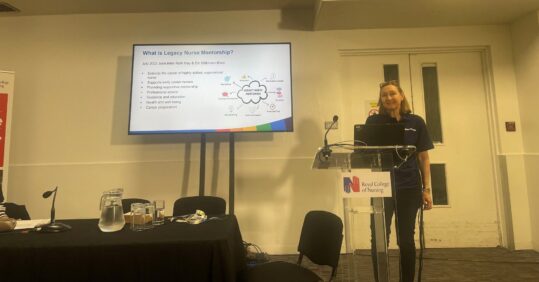‘Inspiring’ mentor scheme supporting GPN retention in Devon

A ‘unique’ mentoring programme in Devon is helping to retain both experienced and new nurses within general practice.
The Legacy Nurse Mentorship initiative, launched last year and spearheaded by Sarah Hall, a general practice nurse (GPN) of more than 20 years, is currently supporting 23 nurses who are new to general practice.
The scheme within the Devon Integrated Care Board (ICB) sees the role of a ‘legacy mentor’ – an experienced GPN – partnered up with a new-to-general practice nurse to provide supportive mentorship through professional advice and guidance.
It followed a letter from chief nursing officer for England, Dame Ruth May and Professor Em Wilkinson-Brice, national director for people at NHS England, which signalled legacy nurse mentoring programmes as a key area for nurse retention.
The scheme in Devon is believed to be one of the only programmes of its kind specifically tailored to general practice nursing.
Related Article: New preceptorship package for social care nurses
The Devon ICB has 120 GP practices and 31 primary care networks serving a population of 1.1 million people.
But NHS data from 2020 showed just 5% of GPNs in Devon were under the age of 30 and that potentially as much as half of the most experienced and skilled GPNs could retire by 2025.
Amid concerns about high retirement levels, coupled with existing workforce shortages seen across the country, the legacy nurse mentorship programme was launched to help support recruitment, as well as the retention of both new nurses and those who are most experienced.
Speaking at the Royal College of Nursing’s annual conference earlier this month, GPN strategic lead at NHS Devon Ms Hall said the initiative was about experienced nurses ‘using their skills or experience to support nurses who are early in their career’.
‘It’s providing supportive mentorship, it’s professional advice and guidance, it’s supporting education, it’s supporting health and wellbeing, supporting career progression for those who are new to the practice; but it also supports retention of those of our most experienced and skilled nurses,’ she said.
She and the team have secured funding for five years to run the programme, which also gives mentors a specialist accreditation.
As part of the requirements, mentors must have five years’ experience and have capacity to participate in the scheme while continuing to work as a GPN.
And under the programme, nurses who are new to general practice are given up to 40 hours of mentorship over a one-year period.
Related Article: Applications to study nursing in England at ‘new low’
‘It’s designed to encourage nurses to want to become mentors, but it’s also designed to support those new nurses in general practice,’ said Ms Hall.
During her presentation at RCN Congress, Ms Hall shared examples of those involved in the programme.
One mentor had said: ‘It just felt really important that we have some support for nurses coming into the practice.
‘It also sort of inspired me. I was at the end of my career almost thinking about giving up. And it’s just given me a lease of life as well. It’s just energised me.’
Another said: ‘It makes you reflect on your own practice. And you’re giving something back to practice nursing. It’s as simple as that.’
Meanwhile, a mentee on the scheme said: ‘I probably wouldn’t have made it through without having a mentor, just having someone that you can ask questions; to feel safe asking questions and a safe environment.’
Related Article: Paul Rees appointed as permanent NMC chief executive and registrar
Ms Hall noted the scheme was ‘constantly being reviewed and evaluated’.
‘We really value the feedback that we get both from our mentors and our mentees, we listen to them,’ she said.
‘The mentors helped us to write the job description, they are the ones that keep coming back with little tips, things that we can tweak, and we change it. It’s constant co-production. And I think that’s why it’s so successful.’

See how our symptom tool can help you make better sense of patient presentations
Click here to search a symptom




